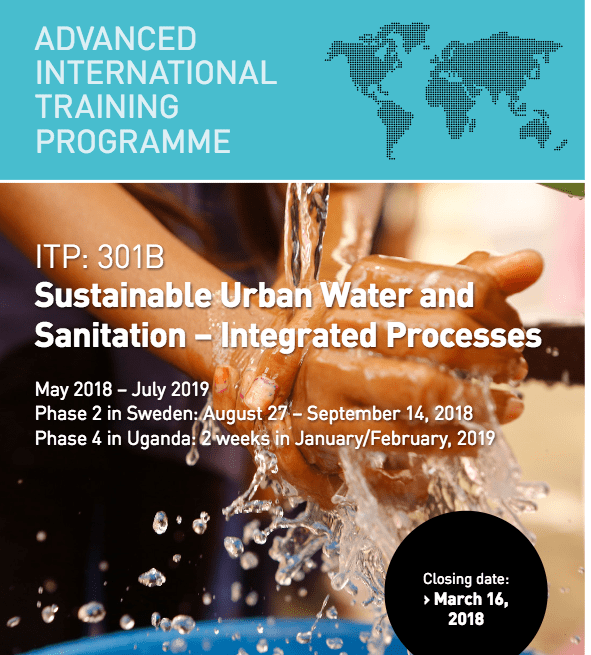Application Deadline: March 16th 2018
The SIDA International Training Programme’s overarching objective is to contribute to improved planning and implementation of better sustainable urban water and sanitation services, where the rights, needs and demands of all citizens, including those of marginalised groups, are taken into account.
The term sustainability addresses environmental, social and economic long-term factors. Sustainability can be achieved only through an increased awareness of the need for integrated approaches and for long-term systems and by supporting key organisations in their processes for such a change.
BENEFITS FOR THE PARTICIPANT
- Increased knowledge of methods and tools for planning of sustainable urban water and sanitation systems
- Increased capacity to initiate and drive organisational change processes
- Shared experiences from colleagues in other parts of the world
- Extended network
BENEFITS FOR THE ORGANISATION
- Professional support for more sustainable and inclusive water and sanitation services
- Educated and encouraged staff that will help achieve your strategic goals
- Collaboration opportunities with various organisations, experts and agencies
Target Group
Candidates may be nominated by authorities, institutions, universities, NGOs, water utilities or other private companies active in the water and sanitation sector.
The programme is primarily targeting organisations, not individuals, and efforts will be made to establish long-term relationships with key organisations. Such collaborative organisations should be willing to commit themselves to participation over several years and to cooperate with other organisations in the programme. Capacity and interest to drive change processes to achieve their long-term goals, and a certain level of influence on the water and sanitation sector, is a prerequisite to become a collaborative organisation. Candidates from collaborative organisations may be prioritised.
Applicants to the programme should:
- hold a key position in their organisation, with influence on a strategic level
- have the engagement and power to initiate and drive change processes;
- hold a relevant academic degree; and
- be available and motivated for active participation through the whole training programme.
Invited countries and areas:
Kenya, Rwanda, Tanzania, Uganda and Zambia.
To promote actual collaboration and integration between participants in their national working context, the programme aims to gather organisations operating in the same geographical area. The programme is therefore focusing on the following areas:
Kenya – Narok
Rwanda – Kigali
Tanzania – Babati
Uganda – Amuria and similar smaller towns
Zambia – Lusaka
Organisations working in other areas than the above, are also welcome to nominate candidates, but should be aware of the priority given to the selected areas.
Contents
The programme will address the following four priority themes:
Systems that Deliver – How to develop and transform systems to realize the human right to water and sanitation, and what it takes in terms of addressing governance, standards, decision-making processes, finance, and inclusion of marginalised groups.
Integrated Approaches – How to work holistically with urban development, manage conflicting goals, increase synergies across sectors and spur collaboration between organisations and institutions at city-level and beyond.
Sustainable Solutions – How to find approaches, practices and technology that is contributing to more sustainable service provision, as use and reuse of water, innovative sanitation solutions and new methods of improving hygiene practices.
Organisational Change – How to work as a change agent and manage change processes that will strengthen the organization’s ability to support and deliver improved water, sanitation and hygiene activities and services.
Downloads:

